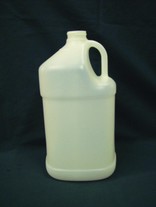How to Make Magnesium "Oil"

HOW TO MAKE MAGNESIUM OIL
BENEFITS OF MAGNESIUM
Magnesium is one of the most abundant minerals on the planet. It’s vital to hundreds of functions in the human body. Many people are depleted in magnesium, especially those with body pain and fibromyalgia. People who get heart attacks and rushed to the emergency room are often given intravenous magnesium. Imagine the benefits if magnesium were taken before the system reached such a crisis state!
Magnesium, taken orally, can cause diarrhea if taken to excess. However, when absorbed through the skin (transdermally), much more can be utilized at one time without causing gastrointestinal distress, since the delivery system bypasses the digestive tract. Transdermal magnesium is called magnesium “oil.” Sold on the internet and in health food stores, magnesium oil can be pricey. I save lots of money by making my own. Here’s how.
WHAT IS MAGNESIUM "OIL"?
Magnesium “oil” is actually one form of magnesium—magnesium chloride—in water. The texture is oily, but technically it’s not an oil as we commonly use the term. The magnesium is commonly in flake form, to which water is added until the flakes dissolve. You may be familiar with magnesium chloride by its other name: nigari.
(Parenthetically, nigari is familiar to those who make tofu: it’s the substance that coagulates the cooked soybeans. Tofu is not a healthful food to eat because—aside from the GMO problem—soy is loaded with plant estrogens and other phytochemicals that feminize males, give females early-onset puberty, and lower thyroid function in everybody. However, nigari is great for making magnesium oil.)
Nigari can be either magnesium chloride or calcium chloride; but for making magnesium oil we’re obviously interested in magnesium chloride.
WHERE TO GET THE RAW INGREDIENTS
The cheapest way to get magnesium oil is to make it yourself. Prices might have increased since I last bought the nigari flakes, but the best buy I have seen for Japanese nigari (not Chinese nigari—don’t buy it from China), is 5 pounds for $8.49 at http://www.naturalimport.com/shop_for_nigari?b=1. Even when you include shipping, it comes to about $20 for 5 pounds of nigari flakes, which is still a great deal.
HOW TO MAKE IT
This recipe is quite forgiving. Basically, I add water to my magnesium chloride (nigari) flakes until the stuff dissolves. It often comes out to about equal parts of each. Put the flakes into a glass mason jar with a plastic lid, and gradually add water. Shake the jar at regular intervals until the mixture dissolves. If it doesn’t dissolve completely, add more water. It may take a few hours for the flakes to dissolve, so be patient. The best water to use is distilled, but if you don’t have distilled, use clean filtered water.
BENEFITS OF MAGNESIUM OIL
One major advantage to applying magnesium oil transdermally (through the skin) is its beneficial effect on sore muscles. Often, soreness in muscles is an indication of magnesium deficiency. Another advantage is that it enters the bloodstream almost immediately. Since you avoid the digestive tract entirely, you eliminate the problem of diarrhea that people sometimes get when taking large amounts of magnesium.
Due to the poor quality of our drinking water, it is believed that many people are deficient in magnesium. It’s difficult to overdose on this mineral, although it can happen. As with any nutrient, monitor yourself and see how you feel.
DISADVANTAGES (slight)
The only disadvantage of magnesium oil is the possibility of itching when you rub it into your skin. If this happens, simply put plain, clean water on the skin. This will dilute the magnesium preparation and relieve the itching.
OTHER FORMS OF MAGNESIUM
Magnesium chloride does not work well if you take it orally. For oral use, you could try magnesium citrate (available at www.msm-msm.com, www.iherb.com, and lots of other places). Epsom salts, another magnesium compound, can be dissolved into a hot bath. However, with Epsom salts the benefits can be short-lived, and you don’t get as much magnesium into the body as when you use magnesium chloride.
